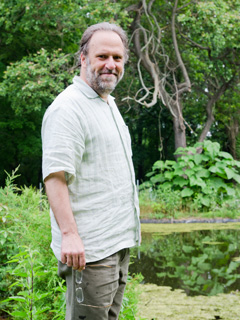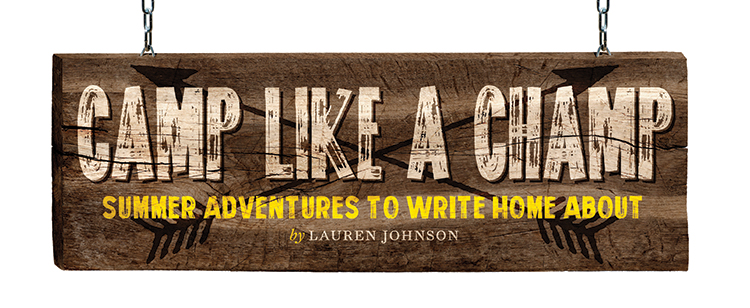
story by Ariela Rose | photo by Kimberly Kunda
For a self-described “ecology geek” like Mike Weilbacher, the chance to direct the Schuylkill Center for Environmental Education—Northwest Philly’s 340-acre green treasure—is a dream realized. Formerly executive director of Lower Merion Conservancy and, for the last year, Abington’s Briar Bush Nature Center, the Long Island native is one month into his new post, and busy creating new programming that will attract both children and adults to what he refers to as the “Mother Ship” of local nature centers.
You worked at the Schuylkill Center as a museum educator in 1982 after completing graduate school [at the University of Michigan]. Can you tell me more about your initial experience?
In ’82, I wanted to get back to the East Coast, so I answered an ad to become an environmental educator on the staff at the Schuylkill Center, and stayed about a year and a half. What I did learn coming to the Schuylkill Center was that I wanted to stay in Philadelphia. I loved this city, loved the whole area, so deliberately decided to do work here. For 15 years, [I] directed the Lower Merion Conservancy, which did some environmental education. I did a lot of environmental work, but mostly on the advocacy and preservation side. But, just after I turned 50, I made this decision mentally that I wanted to go back to “Plan A.” Plan A was directing a nature center; that’s what I always wanted to do. The Briar Bush opportunity arose and I grabbed that. I was incredibly happy—loved Briar Bush, still do—but it was only a few months into my time at Briar Bush that I heard the Schuylkill Center position was open. I guess for me… the chance to direct the Schuylkill Center was essentially a once-in-a-lifetime opportunity.
You’ve been teaching children about the natural world as “Mike the All-Natural Science Guy” on WXPN’s Kids Corner for 23 years. Why is it important to ensure that young people are well-versed in environmental issues?
I come at it from two different places. The first is that my job as an educator is to help children become citizens that are capable of wrestling with the complicated environmental issues they’re going to get as adults. The second is that there’s more and more evidence that kids who grow up connected to nature are smarter, [more]emotionally grounded, calmer, more resilient, less ADD; there’s just unbelievable benefits for children growing up with an immersion in nature.
Have you run into any challenges thus far at the Schuylkill Center, or are there any challenges you foresee encountering as executive director?
We’ve been coming out of a time when all nonprofits are facing budgetary struggles, so one of the issues that we’ve had to wrestle with is fundraising. [Another] is a freshening of our programming. What’s the relevant mix of programming that a nature center in the city should be doing in the 21st century? That’s a big question for us. We’re a wonderful oasis of green space, one of the biggest protected parcels of land in Philadelphia, if not the biggest. As schools lose their budgets, one of the problems is that kids aren’t going to nature centers the way that they used to. So, we have to be incredibly creative in responding to that. Just when kids need to be in nature the most, it’s increasingly hard for them to do so.
What initiatives do you have planned to get more children to the Schuylkill Center?
The staff and I have just begun brainstorming some of the new things.… It’s going to be clear by the fall when we unveil our new school programming. Something else I want to do is—people think of nature centers as places where school kids come, not remembering that a nature center is a place where an adult can explore environmental issues. I want to make the Schuylkill Center more relevant to adults to come without their kids. Here’s a place where you can wrestle with some of these big issues like, Marcellus Shale, like stormwater, like biological diversity.
What propelled your interest in environmentalism, as well as environmental education in the first place? In seventh grade I knew I wanted to do environmental work; I founded the high school ecology club on Long Island where I grew up. I read voraciously all through high school; I always had an environmental paperback on top of my pile of text books when I was going back and forth to class, so I just kept reading. In ninth grade when we got to the ecology unit at the end of the year, the teacher just turned to me and said, ‘Mike, you teach this part,’ [laughs]. So I was sort of the ecology geek of the school. I went to college knowing I wanted to do environmental work, but not which piece of it. Just that field itself has lots of angles. I went to Cornell as a Wildlife Biology major, and within weeks discovered they had an environmental education major, so I got really lucky. I didn’t know that there was something called environmental education, it’s not something you read about much. Once I actually taught something and learned that you can actually teach about the environment as a profession, I knew what I was doing. My freshman year of college my fate was sealed.
I hear you perform Vaudevillian-style Theater about nature and science. Can you tell me more? My Masters Degree was, ‘How to use theater to teach about the environment.’ One of the things that I did was, myself and a partner, created this sort of [pauses and laughs]… it’s movement oriented, kind-of a marriage of circus with pantomime style theatre, where I’m choreographing the audience to do things with me the whole time. I can get several hundred people to dance photosynthesis with me. It’s an auditorium full of kids, and they’re essentially dancing photosynthesis [laughs]. Through a big chunk of the nineties I did that full-time; I traveled full-time from school to school doing these shows. I do want to figure out a way to blend this theater as a program into the Schuylkill Center.
Any final thoughts? I think that sustainability has been a big topic of conversation in the city of Philadelphia, and Philadelphia has just made incredible strides in the sustainability conversation in recent years. The Water Department’s plan for how it handles water in the years ahead is just visionary, and puts Philadelphia on the cutting-edge of that issue. The Schuylkill Center has been here doing this kind of work for almost 50-years. We’re just really thrilled to be positioned where we are; where we’re going to help in the conversation that this city is having to make it one of the ‘greenest’ cities, if not the ‘greenest’ city in the U.S.
For more on the Schuylkill Center, visit schuylkillcenter.org.



